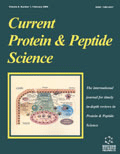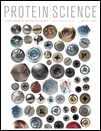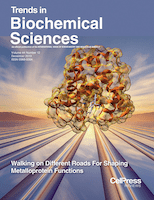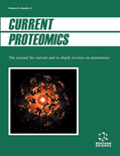
CURRENT PROTEIN & PEPTIDE SCIENCE
Scope & Guideline
Navigating the Evolving Landscape of Protein and Peptide Science
Introduction
Aims and Scopes
- Protein and Peptide Therapeutics:
The journal consistently publishes research on the therapeutic applications of proteins and peptides, including novel drug development, delivery systems, and therapeutic efficacy in diseases such as cancer, diabetes, and infections. - Biochemical Mechanisms and Pathways:
A significant focus is placed on elucidating the biochemical pathways and molecular mechanisms involving proteins and peptides in various biological contexts, including cellular signaling, immune responses, and metabolic regulation. - Bioinformatics and Computational Analysis:
The journal highlights the use of bioinformatics tools and computational methods to understand protein structure, function, and interactions, thus aiding in drug design and discovery. - Natural and Synthetic Peptides:
Research on both natural bioactive peptides derived from various sources and synthetic peptides designed for specific applications is a core area, encompassing their discovery, characterization, and potential therapeutic applications. - Role of Post-Translational Modifications:
The impact of post-translational modifications on protein function and stability, as well as their implications in disease pathology, is a recurring theme in the journal's publications.
Trending and Emerging
- Peptide-Based Cancer Therapies:
There has been a marked increase in research focusing on peptide-based therapeutic strategies for cancer treatment, highlighting their potential in targeting specific pathways and enhancing treatment efficacy. - Bioactive Peptides in Nutrition and Health:
Emerging studies on bioactive peptides derived from food sources are gaining traction, emphasizing their roles in health promotion, disease prevention, and as nutraceuticals. - Innovative Drug Delivery Systems:
Recent publications are increasingly exploring novel drug delivery systems utilizing peptides for targeted therapy, improving bioavailability, and reducing side effects. - Antimicrobial Peptides:
The exploration of antimicrobial peptides is on the rise, driven by the urgent need for new therapeutic agents to combat antibiotic resistance, with a focus on their mechanisms of action and potential applications. - Post-Translational Modifications in Disease:
An increasing number of studies are investigating the role of post-translational modifications in various diseases, linking biochemical mechanisms to potential therapeutic targets.
Declining or Waning
- Traditional Enzyme Applications:
Research focusing on conventional enzyme applications, particularly in industrial settings, has decreased, possibly due to the rising interest in novel enzyme engineering and biocatalysis for more specialized applications. - Basic Structural Biology:
While foundational studies in protein structure remain important, there has been a noticeable decline in publications emphasizing purely structural biology, as the field shifts towards functional studies and applications in therapeutics. - Plant Proteins in Agriculture:
The exploration of plant proteins specifically for agricultural enhancements has waned, as attention has shifted towards the therapeutic potential of plant-derived peptides and their roles in human health.
Similar Journals

MOLECULAR BIOLOGY
Pioneering Research in Molecular Biology Since 1971MOLECULAR BIOLOGY, published by PLEIADES PUBLISHING INC, serves as a vital repository for the dissemination of innovative research within the fields of biochemistry, genetics, and molecular biology. With an ISSN of 0026-8933 and an E-ISSN of 1608-3245, this journal has been a mainstay in the scientific community since its inception, embracing its deep historical roots from 1971 to the present. Recognized for its qualitative contributions, MOLECULAR BIOLOGY is ranked in the Q3 quartile for Biophysics and Q4 for Structural Biology, placing it among select journals in its domain. Researchers and students alike benefit from its rigorous peer-reviewed articles, which focus on all aspects of molecular mechanisms and interactions. The journal's inclusion in prestigious databases underlines its commitment to academic excellence. The editorial board is dedicated to fostering the sharing of influential findings, making it an essential resource for advancing knowledge and innovation in molecular biology.

BIOCHEMICAL AND BIOPHYSICAL RESEARCH COMMUNICATIONS
Fostering innovation in biochemical and biophysical research.BIOCHEMICAL AND BIOPHYSICAL RESEARCH COMMUNICATIONS, published by Academic Press Inc Elsevier Science, stands as a leading periodical in the fields of biochemistry, biophysics, cell biology, and molecular biology. With an ISSN of 0006-291X and an E-ISSN of 1090-2104, this esteemed journal has been a pivotal platform for the dissemination of groundbreaking research since its inception in 1959, continuing to publish influential findings through at least 2024. It holds a commendable Q2 ranking in Biochemistry and Q1 status in Biophysics as of 2023, reflecting its high impact and relevance in the field, supported by its strong Scopus rankings—ranking #43 in Biophysics and maintaining a presence in the top quartiles of several related categories. Although it is not an open-access journal, it provides critical insights and essential data that cater to researchers, professionals, and students keen on advancing their understanding of complex biochemical and biophysical processes. Its significant contributions to the scientific community underscore the importance of this journal as a reference point for innovative research and collaborative discourse.

Doklady Biochemistry and Biophysics
Unveiling the Complexities of Biological Systems Through Rigorous ResearchDoklady Biochemistry and Biophysics is a vital resource for the advancement of knowledge in the fields of biochemistry and biophysics, published by MAIK NAUKA/INTERPERIODICA/SPRINGER. Featuring an ISSN of 1607-6729 and an E-ISSN of 1608-3091, this journal plays a critical role in disseminating research findings and fostering scholarly discourse. Despite its recent ranking in the Q4 quartile for biochemistry and biophysics in 2023, it serves as an essential platform for researchers exploring these intertwined disciplines. The journal’s scope encompasses a wide variety of topics, enhancing the understanding of biochemical processes and physical principles in biological systems. With converged years of publication from 2001 to 2024, it stands as a continual source of knowledge for its readers, who include researchers, professionals, and students alike. While the journal currently does not offer open access options, its contributions remain significant within the scholarly community, illustrated by its competitive Scopus rankings across related fields.

BIOORGANIC CHEMISTRY
Advancing the frontiers of biochemistry and organic chemistry.BIOORGANIC CHEMISTRY, published by Academic Press Inc., a prestigious imprint of Elsevier Science, represents a cornerstone in the fields of biochemistry, organic chemistry, and drug discovery. With an impressive Scopus rank placing it in the top quartiles across critical categories—including Q2 for Biochemistry and Drug Discovery, and Q1 for Organic Chemistry—this journal has established itself as a vital resource for researchers, professionals, and students alike. Featuring a diverse array of articles that explore innovative methodologies and emerging trends from 1971 to the present, BIOORGANIC CHEMISTRY effectively bridges the gap between laboratory research and practical applications. Although not an Open Access journal, its rigorous peer-review process ensures the delivery of high-quality, impactful research that drives advances in the understanding and application of biochemistry. With an aim to facilitate scientific discourse and collaboration, it invites contributions that further the exploration of chemical processes within biological systems.

Peptide Science
Innovative insights into the world of peptide chemistry.Peptide Science, published by Wiley, is an esteemed journal dedicated to advancing the understanding of peptide chemistry and its applications across various scientific disciplines, including biochemistry, biophysics, and organic chemistry. Since its inception in 2018 and continuing through 2024, this journal has provided an essential platform for the dissemination of innovative research, engaging articles, and critical reviews. With an impressive Q3 ranking in the fields of Biochemistry and Biomaterials, and a Q2 status in Biophysics and Organic Chemistry as of 2023, Peptide Science acknowledges its integral role in addressing significant scientific challenges. This open-access journal ensures that findings are readily available to a global audience, fostering collaboration and knowledge sharing among researchers, professionals, and students alike. The journal exemplifies excellence in scholarly communication, making it an essential resource for anyone interested in the intricate world of peptide research.

CELL BIOCHEMISTRY AND BIOPHYSICS
Pioneering Research in Cellular MechanismsCELL BIOCHEMISTRY AND BIOPHYSICS is a distinguished journal published by HUMANA PRESS INC, focusing on critical advancements in the fields of biochemistry, biophysics, and cell biology. Since its establishment, the journal has provided a robust platform for the dissemination of cutting-edge research, covering diverse aspects of cellular biochemistry and the physical principles that underlie biological systems. With an emphasis on interdisciplinary studies, the journal aims to facilitate knowledge exchange among researchers, professionals, and students from various scientific backgrounds. As reflected in its 2023 category rankings, it holds a respectable position in Q3 for Biochemistry and Cell Biology, and Q2 for both Biophysics and Medicine (miscellaneous), indicating its significant contribution to these fields. Although it operates under a subscription model, the journal's commitment to maintaining high publication standards ensures that only impactful studies are shared with its audience. With a range of articles spanning theoretical insights to practical applications, CELL BIOCHEMISTRY AND BIOPHYSICS is an essential resource for those aiming to stay at the forefront of biochemical and biophysical research.

JOURNAL OF BIOLOGICAL CHEMISTRY
Illuminating Breakthroughs in Molecular BiologyJOURNAL OF BIOLOGICAL CHEMISTRY, published by Elsevier, is a premier interdisciplinary journal dedicated to advancing our understanding of biochemistry, cell biology, and molecular biology. With a prestigious history dating back to 1945 and an impressive convergence of research expected to continue through 2024, this journal holds a Q1 ranking in all three of its core categories, signaling its critical influence in the respective fields, supported by a robust Scopus ranking that places it among the top echelons of internationally recognized research. Although currently not available as Open Access, the journal is essential for researchers and professionals looking to stay abreast of the latest breakthroughs and innovations in biochemical research. With a deep commitment to scientific rigor and a focus on diverse topics ranging from cellular processes to molecular mechanisms, the Journal of Biological Chemistry serves as a vital resource for the academic community, shaping the future of biological sciences.

PROTEIN SCIENCE
Pioneering Insights in Biochemistry and Molecular BiologyPROTEIN SCIENCE, published by Wiley, is a premier journal dedicated to the field of biochemistry, molecular biology, and medicine, boasting an impressive impact factor that reflects its influence and importance within the academic community. Established in 1992, the journal has continuously provided a platform for high-quality research, with a current classification in the top quartile (Q1) for its critical contributions to the understanding of protein structure and function, as well as its applications in health and disease. With a Scopus ranking placing it in the 91st percentile among its peers, PROTEIN SCIENCE publishes cutting-edge studies and reviews that are essential for researchers, professionals, and students seeking to advance their knowledge in protein research. Although it does not currently offer open access options, the journal remains dedicated to disseminating vital findings that support the ongoing advancements in molecular biology and biochemistry. Researchers can count on PROTEIN SCIENCE for consistently rigorous peer-reviewed content that fosters meaningful dialog and innovation in the life sciences.

TRENDS IN BIOCHEMICAL SCIENCES
Unveiling the Latest Trends in BiochemistryTRENDS IN BIOCHEMICAL SCIENCES is a premier academic journal published by CELL PRESS, focusing on the latest advancements and insights in the dynamic fields of biochemistry and molecular biology. With an ISSN of 0968-0004 and an E-ISSN of 1362-4326, this journal has established itself as a leading source of high-impact research, boasting an impressive Q1 category ranking in both Biochemistry and Molecular Biology as of 2023. The journal's Scopus Ranks further highlight its significance, placing it in the top 3% and 4% of its respective fields, emphasizing its role as a vital platform for disseminating innovative research. Published since 1976 and continuing through 2024, TRENDS IN BIOCHEMICAL SCIENCES provides a comprehensive overview of the latest trends, methods, and applications, helping researchers, professionals, and students stay at the forefront of their disciplines. Although it offers traditional access options, the journal's rich content and authoritative analysis make it a must-read for those pursuing cutting-edge biochemical research.

Current Proteomics
Advancing the Frontiers of Proteomics ResearchCurrent Proteomics is a distinguished journal dedicated to the dynamic field of proteomics, offering researchers and professionals a platform to disseminate innovative findings and comprehensive reviews. Published by Bentham Science Publishers Ltd, this journal caters to a global audience and serves as an essential resource for students, academics, and industry experts interested in advances in biochemistry and molecular biology. With an ISSN of 1570-1646 and an E-ISSN of 1875-6247, the journal has established itself in various research categories, achieving a Q4 ranking in both Biochemistry and Molecular Biology as of 2023. While the impact factor and H-index data are not specified, its Scopus ranking reflects a competitive position in its fields, with percentiles in the 12th to 16th range. Although not an open-access journal, Current Proteomics is vital for fostering ongoing dialogue and collaboration in proteomic research, encouraging contributions that explore cutting-edge methodologies and applications. Researchers are invited to share their insights and contribute to this evolving discipline, thus enhancing the collective understanding of proteomics within the scientific community.